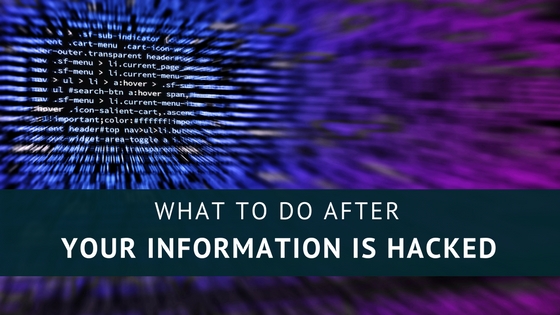The past few years, it’s become increasingly common to hear that companies were hacked and accidentally leaked confidential information about their clients or customers. Most often, this issue occurred at retailers who had certain credit card information stored. Monitoring whether or not you were compromised was simply watching for suspicious activity on your card or getting a new one. However, with the Equifax data breach this fall, more people than ever are concerned about the safety of their personal information. Having your social security number and other important identity information leaked is incredibly serious and might not be detected for a few years, until someone decides to use this information. When you find out there’s a chance your information has been leaked, here are some tips on how to protect yourself.
Monitor your current accounts
The first step you should take once finding out your accounts or information could be compromised is to carefully monitor any accounts you currently possess. Always look over your credit card and bank statements and make sure you recognize all of the charges. If you notice something strange, immediately contact your bank or credit card company. The more vigilant you are, the sooner you can catch any issues and take care of them.
Set up credit monitoring
While you can opt to use a paid service to monitor your credit, there are also plenty of free services out there you can use, such as Credit Karma. You can download an app on your phone that periodically updates to show any recent accounts opened in your name and for how much money. Choose a credit card monitoring service you feel comfortable using and regularly check to make sure no unknown accounts have been opened. Also, if you receive any emails or phone calls about new accounts, follow up and see if someone opened something in your name.
Change your passwords
You should periodically update all of your passwords, no matter what account it’s for or what personal information it contains. Make your passwords complex; consider using a random password generator so they can’t be guessed. Regularly updating passwords help prevent people from hacking directly into your accounts or using information that was breached to get into them.
Remain vigilant
It’s likely you’ll be incredibly vigilant the first few months after you learn about a data breach, but once other aspects of life get in the way, it can be difficult to keep up this habit. Even if you see no strange activity, continue checking your credit monitoring service once a week. Sometimes, personal information that’s stolen isn’t used until years after the initial breach.
Consider a credit freeze
Another option you have is implementing a credit freeze. A credit freeze prevents any new accounts being opened in your name because companies will be unable to verify the information given. However, a credit freeze costs you, usually around $10 per account. While this method prevents your information from being used, it can be inconvenient if you need to open new accounts; unfreezing credit costs additional money and can take time to do.

